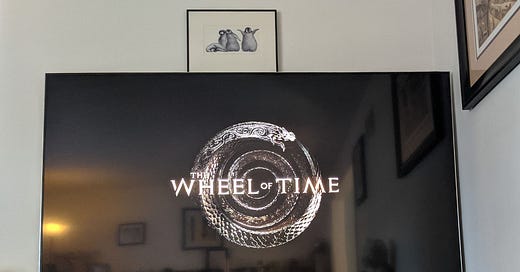As previously mentioned, we’ve been watching The Wheel of Time adaptation on Amazon Prime (not in a super timely way, but on Saturday mornings after the episodes drop on Thursday), and have generally enjoyed it. They’ve made a bunch of changes in the transition from page to screen, but for the most part those have made sense. We’re also watching with SteelyKid, who hasn’t read the books but doesn’t seem to be having much trouble following along, which I think speaks well of the show.
I’ve also been reading reviews and commentary on the show, and was particularly struck by this piece by Kaitlin Thomas in Paste about how the show fits in with fantasy more generally. I like the show better than she does (four episodes in, anyway), but think the essay is really smart in noting that The Wheel of Time, like some of the other recent fantasy projects that have failed to become “the next Game of Thrones” faces a really hard problem in the richness of the setting. The secret to the success of Thrones is that, particularly in the early going, it has minimal fantasy elements.
That may seem a weird thing to say about a show that famously featured ice zombies and fire-breathing dragons, but those things are only slowly revealed. In the early seasons of the show (and most of the books that actually exist) it’s really a costume drama with extra bonus incest and murder. That makes it easy to bring in a wider audience, who might balk at a show that had to explain dragons and ice zombies from the very beginning.
Of course, for a different segment of the audience, the lack of those things is a weakness. That segment includes me— I was never a watcher of the show (we didn’t have HBO when it was running), and I got fed up with the books just teasing the interesting fantasy elements and instead wallowing in mundane torture and rape. (Also, Martin had pretty clearly lost his grip on the plot by the start of the last published book, and by the end of it I had decided that he was never going to finish the series in anything resembling a satisfying way.) I’m much more interested in works that put the fantastic elements front and center.
That leaves the makers of The Wheel of Time in a nearly impossible position. The book series was massively successful in large part because of readers who wanted all the complexity of the setting and the many unfamiliar elements that come with that. Moving to TV, though, requires them to appeal to an audience that mostly won’t tolerate either too much exposition or too much in media res storytelling with unfamiliar elements explained in context. That’s an incredibly difficult needle to thread.
This reminded me of my reaction to the reaction to the new Dune movie, where one of my favorite podcasts went full mundane over the worldbuilding there. As noted in that post, they’re also down on The Expanse for having too much exposition, something I find baffling. That specific podcast focuses on movies, and as such hasn’t addressed Wheel of Time, and their general TV podcast seems to be giving it a miss, which is probably for the best.
The core issue here is that the size of the audience needed to make a series of print books massively successful is vastly smaller than the size of the audience needed to make a reasonably successful TV show. Let alone making “the next Game of Thrones.” To lowest order, nobody buys books, so the weirdos like me who want heavy fantastic elements in their print fiction are enough to move the needle, while success on the TV scale requires buy-in from a lot of people who don’t like that stuff.
This makes life difficult for the makers of mass-media fantasy content, but more importantly for my narrow interest, it makes engagement with mass culture really frustrating to me. For all that people talk about the current moment as a “golden age of geek culture,” there’s really very little out there in visual media that gets at what I really enjoy about speculative fiction as a genre (on either the sci-fi or fantasy sides). The most readily adaptable properties are mostly pretty shallow comic book/ videogame fare, and when producers do take more ambitious swings, a lot of what I like gets stripped out in an effort to reach a wider audience.
(It’s also still acceptable to disparage and even sneer at SF works when they strive for any kind of depth, in a way that I find maddening. A lot of the bad reviews of Dune complained about the setting in a way that basically boiled down to “Ewww, nerd stuff!” and I wish our elite media would be better than that.)
Anyway, as noted above, SteelyKid has been watching along with us, and seems to be following along without too many problems. At least, we’re not getting any more “What’s going on here?” questions than we do with Movie Night movies like Butch Cassidy and the Sundance Kid and A Knight’s Tale (or Knives Out the first time through). So maybe there’s hope for better things in the future.
If you like this sort of out-of-step cultural commentary, here are the traditional buttons you might want to click:
If you want to quibble with my reactions above, the comments will be open.





Nerdy world-building stuff is huge, and mainstream. Not that I think modern Marvel or Star Wars do a great job of it, but they've shown it's more than viable, commercially.
>it’s really a costume drama with extra bonus incest and murder. That makes it easy to bring in a wider audience
Ah yes, incest and murder, famously bringing in a wide audience.